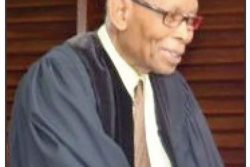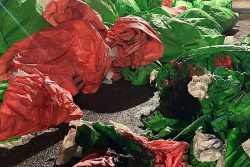In my last column I remembered my old friend H.L. `Bertie’ Taitt, one of a group of us who regularly met for rum, curry lunch and unending talk more than 60 years ago. After I had sent in the column, another memory of Bertie came to mind and I cannot resist telling the story.
Bertie once, I emphasise once, managed a Guyana tennis team to play in Surinam. He proved to be an eccentric and unsuccessful manager.
Early in one match a youngster on the team hit a forehand not just out but sailing out over the fence enclosing the court. On changing ends the youngster addressed Bertie standing grimly by the umpire’s chair:
“Skipper, is wha ah do wrang deh eh?”
Bertie recalled his response. “I was speechless, speechless. Managers must inspire their charges. How could I tell the young man, this leading aspirant in our ranks, that a complete lack of talent combined with an obvious inability to learn the rudiments of the game had given rise to this obscenity of a stroke, this desecration of tennis. I remained silent. Perforce.”
After the team returned home, the President of the Guyana Lawn Tennis Association insisted that Bertie must produce a Manager’s report on the tour. Bertie insisted there was no need. In this clash of wills there could be only one victor. Bertie explained his reasoning to our group.
“No report was necessary. Every match was calamitous. We achieved nothing. It would have been embarrassing to add that, however, the rum was good and the cream of Guyana’s tennis performed exceptionally well at the cocktail parties!”
Thus do memories of old friends come back fresh as this morning’s wind on the seawall, vivid as the hummingbirds that dart momentarily among the flowering trees at dusk. Beside the snapshot of Bertie Taitt which brought back my memories of him there was one of Gordon `Gig’ Delph, another old friend well-remembered.
When a good friend disappears, the world stops for a moment and then goes on. But in that moment we think so many things – the times one had, sweet days gone by, images of friendship printed on the mind. For a moment, also, his sudden silence tells us what shadows we all are and what shadows we pursue. The shadows are as numerous and as fleeting as on a moonlit night – power and the fruits and fears of power, deeds of great renown, fame and fortune, possessions that soon grow dry as dust, the domination of people and self-regarding, tall ambition. All shadows, every one of them, that disappear like a morning mist. Gig pursued his shadows too, as all men do, but his were other shadows. His shadows were the love of family and friends, laughter and making life seem good, the pleasant passing of a holiday with talk and humour and old memories and a steam or two, kindness and a hospitable home, a glorying in children. These are passing shadows too, but shadows of a kinder day than those which darken most men’s lives.
The general mistake most of us make is that we squeeze the pleasures of friendship and laughter, food and drink and exercise and love, into the narrow margins of one’s days which we then fill with ambition and the worship of career and things and money and claiming power over others. My friend Gig never made that great mistake. He put ambition at the very edge of life and filled his days with family and friends and fun.
More than 60 years ago we began to play tennis together. A group of us met regularly to play, sometimes for fun, sometimes for hard practice in preparation for tournaments. After the games we would sit and talk, laugh and dispute and set the world to rights for hours. Nothing out of the ordinary, I know, but the memory of that good fellowship has never left me. I think perhaps it is in the enjoyment of the company of friends that we find an easy harmony that surely must be one of the best things in the whole of life. Gig was in his element in our group, he revelled in the company of friends. He shared his enthusiasms with a lovely zest for life. He was expert at carpentry and fixing bikes and playing dominoes and making kites and mauby-brewing with special tinctures. He lightened life when it was heavy.
In the tennis, Gig was a quick-eyed, first-class sportsman. He was also a fine cricketer and footballer and athlete. But if ever the ruthless, latter-day obsession with winning at any cost was alien to anybody it was alien to Gig. Winning was good if it didn’t hurt the other man too much and if everybody still had fun. I was his captain once or twice in the Guyana tennis team long ago and I remember there were times when his good-humoured acceptance of defeat irritated me. He could have won more matches than he did and made fewer friends. But afterwards, when the stupid rage for winning died in me, I saw him again in my mind’s age raising shouts of joy at his own good shots and his opponent’s too, or saw him laughing at some disastrous error on either side, and I knew in my heart he had got it right. “Skipper”, he would say, “today, I’m hurling thunderbolts. Nothing can stop me!” and he would clench his fist and bounce on his toes and smile. I remember that so well.
I remember long ago when I was a boy my father held a dead bird in the palm of his hand and said the beauty all had gone – to see it like that and describe it alive, alive and flying, was to see ashes and try to tell about fire. You cannot describe for others the living friend you had. No one can know my good friend Gig except those who knew him alive, alive and flying, laughing and showing you the sweet of life, joking away the sour.
Pictures flash through the mind. Gig with his old father, I remember, the old man a terror in his time, a beater of sons, but now old and lonely except for Gig and Gig brought him everywhere, to the tennis games and to the homes of friends, so that he would have the company and listen to the jokes and not be lonely. And another memory comes of how when Gig came to lunch he would give my young son a big and long hug and how the little boy always knew he meant it and was never shy. I have no idea what exactly such things tell you about a man except quite simply that his heart was open and that his soul was sound.
I don’t know where Gig is journeying now. There is an Australian aboriginal folk-song about Christian immortality that goes like this:-
“The god-men say when die go
sky, river flow.
The god-man say when die we fly
Just like eagle-hawk and crow:
Might be, might be, but I don’t know.”
I wish I knew. If there is anything, I know all will be well with my old friend Gig. I don’t think he much liked poetry except for a tag or two of Shakespeare, but when he died I said for him some lines from a very great poet who was quite sure where the journey of good men ended:
“Flesh fade, and mortal trash
Fall to the residuary worm; world’s wildfire leave
but ash.
In a flash, at a trumpet crash,
I am all at once what Christ is, since he was what
I am, and
This Jack, joke, poor potsherd, patch, matchwood,
immortal diamond
Is immortal diamond.”
It is strange. So many years have gone. There they are still, my old friends. Hummingbirds in the dusk. I can still see Bertie so clearly in my mind’s eye: “Now listen carefully. Let me explain!” And Gig: “Skipper, see me here. They haven’t got a chance. I hurling thunderbolts today!”










